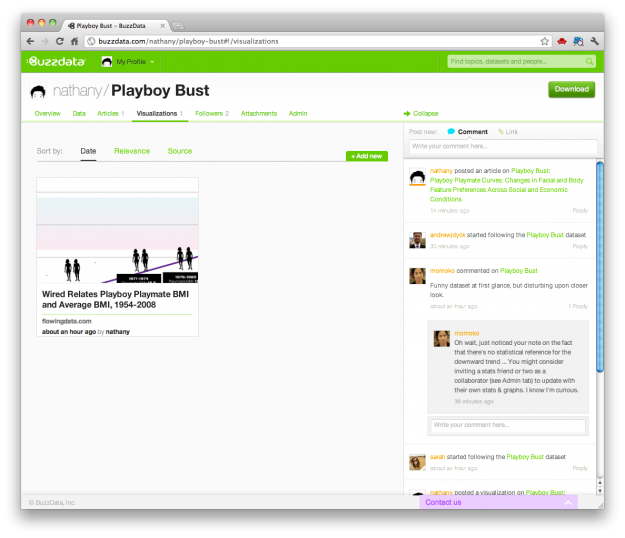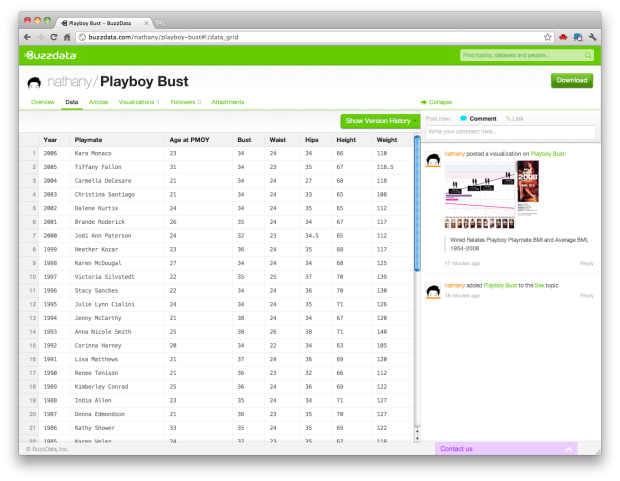In many ways, data wants to be social. It wants to get out there for people to see, interact with other datasets, and it wants people to talk about it. There aren’t that many places for that to happen though. Newly launched BuzzData wants to fill that void. It’s pitched as a “social network designed for data.”
You might be thinking, “Wait, haven’t we seen this before?” Well, yeah. Again, there’s something about data that wants to be shared, but no one has quite figured out how to make it work on a large scale.
Like those before it, BuzzData lets you upload datasets and lets people comment on said datasets, but that’s where the similarities stop. There are no tools to visualize and explore your data, and the goal is not so much to get people to make as much stuff as they can with the numbers (although that would certainly help support the community), but more to talk about the data and add context.
Once you upload a dataset, you can link to papers or graphics and include attachments. If you make the dataset public, other BuzzData users can follow datasets — like you might follow a question on Quora — and leave comments and suggestions. If you don’t have data to share, you can participate just by following others’ datasets.
The above, for example, is a dataset I uploaded on Playboy Playmate of the Year body measurements. (We saw how things have changed over the decades a while back.) I was also able to provide links to articles and graphics, so you don’t just get a spreadsheet with a link to a source.

If I wanted, I could add collaborators so that that they could help me keep the data up to date.
It’s an interesting concept worth exploring. However, unlike a Twitter or a Quora, there’s less of an immediate gratification when you use it, so it’ll be a challenge to get enough people interested where things are updated frequently. It’s one thing to be excited about data and another to be interested enough to participate.
Then again, maybe there will be a Wikipedia-like flourish with all the excitement around data these days.


 Visualize This: The FlowingData Guide to Design, Visualization, and Statistics (2nd Edition)
Visualize This: The FlowingData Guide to Design, Visualization, and Statistics (2nd Edition)

While this is good, it would be nice to have a visualization tool that will help me in creating a figure from the dataset attached.
Hey Nathan,
Great way to start the day — got a notice from a friend that you posted this; thanks for checking us out and putting in your $0.02.
Re: Visually/Swivel comparisons: yep, as the platform stands right now, there are definitely parallels in the ‘share your data’ department, but in actual fact we have some features up our sleeves still that are probably quite a bit different than anything you’ve seen yet (we hope). Things are gonna get interesting over the coming year.
When we first went public a few weeks back, we highlighted the capacity to ‘share and show off’ your data,” largely because, well, ‘share’ is one syllable, zippy and a value-add people recognize. But BuzzData is really meant to be a place where visible, trackable, and attributable data *collaboration* happens (try putting that into a press release headline :P)
A lot of the major workflow/discovery tools we’re going to release to facilitate this are still in active development. The main advantage of BuzzData will be its ability to foster collaborative efforts toward expanding, revising, analyzing and discussing data such that the data itself (not a particular visualization or app, which “locks” data into a particular format/perspective) floats to the top of your search engine results, becoming a definitive resource on its own, with visible provenance and access to its contributors.
You can read a bit more of our Big-Picture Mission and where we’re ultimately headed on our blog here:
http://blog.buzzdata.com/post/9248725748/what-buzzdata-will-and-wont-be
A good example of a dataset that, through cross-collaboration, has become a comprehensive resource all on its own is one I cobbled together of open-data hubs around the world, which other users (especially amazing open-data hacker James McKinney – jpmckinney on BD) contributed to:
http://buzzdata.com/momoko/open-data-hubs-worldwide
While my original list was a public Google Map (that had not-so-good SEO, for which I never got any feedback or contributions to since March
http://maps.google.com/maps/ms?oe=UTF8&ie=UTF8&source=embed&msa=0&msid=215778307365395762808.00049f8cc68c097fea196
my current dataset on BuzzData has gotten contributions from many people around the world, has nearly 30 followers, and is now the #1 result that comes up when you google “Open Data Hubs” (at least from my computer).
I think our biggest strength is that we’re treating datasets as ever-evolving, rather than static items. Because data is constantly changing.
Cheers!
Momoko (BuzzData communications director)